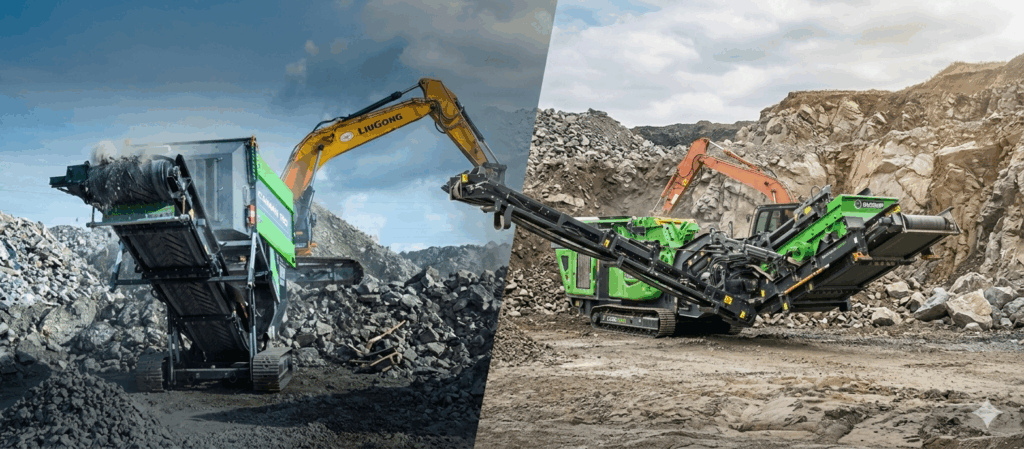This Illinois High School Won’t Give Up on its Heavy-Equipment Education
Johnsburg High is a rarity these days with its classes on heavy equipment operation, thanks to alumni who never want to see the...

Gus Schmid graduated from Johnsburg High School in 1996 with a commercial driver’s license license, thanks to the school’s career and technical education classes.
Fast forward more than 20 years later, and he’s back at the public school in Johnsburg, Illinois, where his daughter is a student. He visited the shop area after being asked to volunteer.
“One part of me was so happy to see so much of the equipment that was there when I was there,” he says. “And another part of me was so sad and heartbroken that that same equipment was still there.”
That sent Schmid on a mission, which has resulted in capturing hundreds of thousands of dollars’ worth of equipment and helped breathe new life into a program that now has a waiting list of students.
Johnsburg High is a rarity these days in that it has maintained many of its vocational classes on campus, and even more rare, it offers classes on heavy equipment operation. Students can also still graduate with a CDL and take classes on small engines and welding. And thanks to a partnership with Skills USA, the Associated Equipment Dealers Foundation and operators’ union, students could become eligible for apprenticeships while still in high school.
{Related Content: Check out Equipment World's Heavy Equipment Operator Pay & Benefits Report}
You might think this is the kind of program for a large high school, but Johnsburg has a student body of only about 500.
So how has such a small school been able to continue vocational education while most schools across the country have drastically cut such programs?
It’s a combination of many factors, starting with alumni like Schmid who benefitted from the program in their careers and want to see it continue for their kids. It’s a school that has been fortunate to have an experienced instructor to teach the courses. And it’s a blue-collar community that appreciates and understands the benefits of a career in the trades.
Principal Kevin Shelton came to the school in 1994 as a teacher and coach and continually hears from former students about the importance of the program, which has been at the school for more than 40 years.
“I used to teach English, and I've had kids come up to me and be like, ‘Listen, man, no offense, appreciated you as a teacher, but I did not like your class much. And if you get rid of the diesel program at the high school, you'll be hearing from me.’
“They said it kind of joking,” Shelton says and laughs, “but kind of not.”
Still Got the ’69 Mack
About five years ago, Shelton tapped Schmid to be a co-adviser to the Skills USA Illinois chapter, a program the hosts vocational competitions for high schools and colleges and helps students find career and educational opportunities in the trades.
As a new volunteer for the school, Schmid saw the 1969 Mack truck he and many others learned to drive to get their CDLs, along with a 1980 backhoe and early 1980s compact loaders.
“And I was like, man, it's great to learn on old equipment,” he thought. “But what are you learning for the current marketplace, for current careers?”
“So I just dug my heels in and started reaching out to local businesses looking for support,” says. “It started to take traction.”
He worked with the McHenry County Cooperative for Employment Education to apply for federal Perkins Grants for vocational education programs. He helped win a grant to replace all the school’s small engines.
The next year, the school got a grant to buy a new John Deere excavator simulator, like the one the Local 150 International Union of Operating Engineers uses to train apprentices. Last year the school scored a new Deere 35C mini excavator for students. He and another parent worked together to revamp the welding shop.
This year, the program just reported a 2018 Vermeer CTX100 mini skid steer with bucket and forks was donated by the Vermeer Midwest dealership. Thanks to another Perkins Grant, the school purchased a 2007 crew-cab semi and trailer to help students get their CDLs.
“Just with grant money and physical money, it’s probably a quarter million that I've been directly associated with trying to get for the program,” he says, “Plus we'll have companies bring in equipment and leave it here for a week or a month.”
National Exposure
 One of the many new pieces of equipment obtained by grants is a John Deere excavator simulator for students to learn on, similar to one used by the local operators' union.Johnsburg High School CTE Facebook page
One of the many new pieces of equipment obtained by grants is a John Deere excavator simulator for students to learn on, similar to one used by the local operators' union.Johnsburg High School CTE Facebook page
The Heavy Diesel 1 and Heavy Diesel II courses are held during the last two periods of the day and consist of three main components: heavy equipment operation, obtaining a CDL and driving a semi-truck, and class work on diesel machinery. The school also offers welding and other vocational courses, some of which are off campus.
Students go out to “the pit,” where all the equipment is waiting, and there’s room to operate.
The school has set up a career pathway, in which students first take the small-engines class. They can then take Autos 1 or Autos 2.
The Diesel I course typically has about 16 students, and Diesel II has four or so advanced students who also serve as mentors for the Diesel I students. In all, about 70 students are enrolled in that pathway program, and there’s a waiting list.
Schmid started a Facebook page for the school’s career and technical education program that helped drive student interest.
“Getting that positive social media out into the community, I think, has done a lot,” he says.
Another boost came when the school earned recognition in 2022 from the Associated Equipment Distributors Foundation, a nonprofit organization that seeks to address the diesel technician shortage through a “community-based, school-to-work” strategy. Johnsburg became one of only 20 high schools in the country to obtain the recognition.
 Nick Benck and his father, Tom Benck, after winning Skills USA’s first-ever national heavy equipment operator competition in June 2023 in Atlanta.AED Foundation LinkedIn page
Nick Benck and his father, Tom Benck, after winning Skills USA’s first-ever national heavy equipment operator competition in June 2023 in Atlanta.AED Foundation LinkedIn page
He’s now a student at Ferris State University with plans to earn a Bachelor of Science degree in Heavy Equipment Service Engineering Technology, the only B.S. degree of its kind in the country. Last summer, he was an intern for a contractor as a mechanic.
“I had a lot of fun in that class,” he says of Johnsburg’s heavy diesel program. He had also taken a welding class. He enjoys working on machinery, he says, and he has operated equipment at his family’s John Deere dealership West Side Tractor in Waucanda.
He believes attitudes in some young people are changing toward trade careers, especially as they find out how much money can be made.
“People are learning that plumbers make more than people who went to school for four years” in college, he says. “So I think it's kind of shifting, which is why more people want to get into it.”
Becoming a Model for the Country
“It was refreshing,” says Nick’s father, Tom Benck, of the first Skills USA competition he attended with his son. “Because you hear a lot about, ‘The kids don't want to work like they used to. They want to play on their phone.’ And I found it kind of the opposite. They want direction, and they want to make a six-figure income. They seem highly motivated.”
Benck is vice president at West Side Tractor and has worked with Schmid to build up Johnsburg’s career and technical education. The dealership often provides equipment for the students to use, and its employees speak to students about careers.
His sister, Diane Benck, is the dealership’s operations manager and chairs the Associated Equipment Distributors Foundation, a national nonprofit that seeks to address the technician shortage through a “community-based, school-to-work” strategy.
Last year, the AED Foundation and Skills USA’s Youth Workforce Development Foundation won a nearly $8 million federal grant to spread the word to schools around the country through Skills USA chapters about careers in heavy equipment operation and diesel mechanics. The grant will also help fund apprenticeships for students to work in the field to gain career experience.
Johnsburg became the nation’s first high school to host the new program’s Industry Pathways: Career Experience, with a focus on heavy equipment operators and technicians.
About 550 career and technical students from northern Illinois and southern Wisconsin attended the event in October. Tom Benck cleared three acres near the school beforehand for equipment staging and demonstrations. The dealership provided 13 mini excavators for students to operate, and many other local contractors, dealerships and businesses brought in equipment to stage or be operated and to talk to students about careers.
“The parents want to see more of this,” Benck says. “This community is kind of different, because it's supporting these programs overwhelmingly.”
 John Deere mini excavators from West Side Tractor roll in for the inaugural Industry Pathways: Career Experience in October at Johnsburg High School.Johnsburg High School CTE Facebook page
John Deere mini excavators from West Side Tractor roll in for the inaugural Industry Pathways: Career Experience in October at Johnsburg High School.Johnsburg High School CTE Facebook page
“We wanted to pull together as many of AED’s almost 1,000 members across the country,” Hill says. “How can we pull them together in events like we held at Johnsburg High School, get students to see that it's not just one career field? You're not just an operator or just not a technician. There’re hundreds of career fields that these different companies can represent and different pathways into a great career. They just didn't know it existed.”
But that’s just the first step, he says.
“Step two is then taking all the employers that were at that event and working with them to establish youth-focused apprenticeship programs.” The program is also partnering with the International Union of Operating Engineers on apprenticeships for high-schoolers.
The goal is not to find an employer to take on multiple hirings of apprentices, but to have each business focus on one candidate. He notes that the students participating are already enrolled in technical education and showing an interest in the profession.
“So if you're struggling and you're not connecting with a Skills USA chapter in your state or a local Skills USA chapter in your local high school in your community, you're really missing out as an employer,” Hill says. “I don't want to oversimplify it, but it's one student that you're trying to hire through that Skills USA program.
“You hire them, and it doesn't work, let's regroup and figure out why. But what we're seeing from almost every one of our employers is after that first student, comes a second, comes a third, comes a fourth, because they now see it as a natural pipeline.”
“These are the young men and women that want to be there,” he adds. “Our employers just don't necessarily know how to communicate with them.”
Facing Challenges
 Students operate Deere mini excavators at Industry Pathways: Career Experience event at Johnsburg High.Johnsburg High School CTE Facebook page
Students operate Deere mini excavators at Industry Pathways: Career Experience event at Johnsburg High.Johnsburg High School CTE Facebook page
After he graduated in 1996, he used his experience from the program in his career path. First, he worked on a local farm, then he worked at a water treatment plant while also serving as a volunteer firefighter. He later became a full-time firefighter and has continued to progress, becoming a paramedic and keeping his credentials updated.
“You still see people who are definitely pushing the four-year schools,” he says, “and I tell all the kids, ‘No matter what you do, you will have to continue learning.’”
“You have to be prepared to always learn,” he adds. “That doesn't mean that you have to go to a two- or a four-year school, necessarily, and it doesn't mean you have to do that out of the gate, because you can always go later.”
He sees one of the biggest problems being lack of information about the career opportunities and the money that can be made in the trades.
“There's really no information getting put in parents’ and students’ faces that is really explaining all of that, in my opinion,” he says. “Laying it out and just bombarding people with that information to help quell those misconceptions, I don't think that's happening.”
At least at Johnsburg High School, though, the word is out, and the program has a waiting list of students. But it’s also limited in having only one instructor for heavy diesel and lack of funding to hire more.
“It really does come down to we only have one instructor who is certified to actually teach the class,” says Principal Shelton. “We need to have some kind of feeder program where people that know what they're doing in the field would be willing to maybe teach teenagers what it's all about.”
He envisions professionals in their 50s coming in under a hybrid program for part-time teaching or some other way that would make it easier for experienced workers to become instructors.
“There's truly a need, and there's really not many students that I know of going to college that are looking to be CTE teachers, because they can earn a lot more just going right out into the workforce,” Shelton says.
“That's where I'm hoping that schools can partner with unions, businesses. If you want to help provide a pipeline of kids coming from the high school, we're going to need some people who know what they're doing to figure that out.”
Hope for the Future
 Gus Schmid, bottom right, snaps a shot of students with their new mini excavator he helped obtain through a grant.Johnsburg High School CTE Facebook page
Gus Schmid, bottom right, snaps a shot of students with their new mini excavator he helped obtain through a grant.Johnsburg High School CTE Facebook page
He wants to make sure the program thrives well into the future and that school districts and communities become more involved in preparing students for trade careers.
“There are a lot of students that may not do well academically per se, but they find their place here in these classes,” he says.
He and others also note that many honor roll students are taking the courses.
“More and more students are definitely trying to get into these classes," he says, "because they see the value … and their parents are starting to see the value.”
For that to happen beyond Johnsburg will take volunteers like Schmid to help their schools and communities bring in the kind of investment needed to expand heavy equipment education, which requires lots of expensive machinery.
“If every school had a Gus, it'd be pretty amazing,” Shelton says. “The best decision I ever made was to ask him if he'd be interested.”

 machineryasia
machineryasia 







